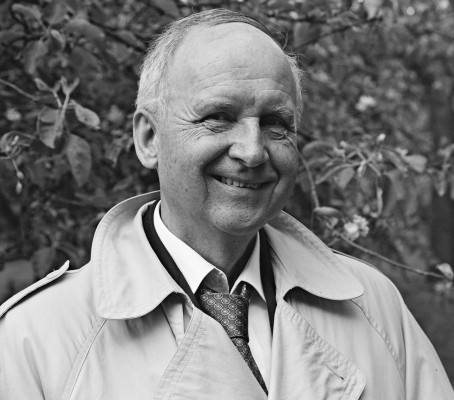
Pauls Dambis
(30.06.1936 )
“Music – as an ingredient in my existence, as a form of exploring reality; in other words, while there is music – I will continue to live.”
Pauls Dambis
The music of P. Dambis is characterised by intellectualism, the intonative uniqueness of Latvian folk music is expressed in it, as well as an interest in Renaissance art and 20th century compositional techniques. BIOGRAPHY Pauls Miervaldis Dambis – composer, teacher, conductor – was born on June 30th, 1936 in Riga. He studied at the Riga 15th Primary School, and the 1st Children’s Music School. From 1950 to 1951 he studied organ performance with Estere Didrihsone, the organist at the Riga St. Paul’s Church. From 1951 to 1952 he worked as an organist and conductor of the choir at St. Anna’s Church in Jelgava. In 1954, he enrolled and, until 1957, studied at the Jelgava College of Music Choir Conducting department with Jānis Kaijaks. During this time, he was the artistic director of the Jelgava region culture centre, as well as the conductor of many choirs, and wrote about musical questions for the newspaper Zemgales Komunists. From 1957 to 1962, he studied in the composition department of the Latvian State Conservatory, where he graduated the class of Valentīns Utkins with the cantata Dzimtenes ūdeņi sauc (The Waters of the Homeland Call). During his studies, he was the lead conductor of the choirs of Ludza, Limbaži, and Jūrmala, as well as leading a vocal trio and being their piano accompanist.
From 1960 to 1962, P. Dambis was the director of the Drama Theatre music division, and from 1964 to 1968, he was the sound director and composer for the TV film union Telefilma Rīga. As of 1966, P. Dambis is a member of the Latvian Composers’ Union, and was deputy director of the board (1968-1978), and director of the board (1984-1989). From 1972, he was a lecturer at the Latvian State Conservatory, later, at the Latvian Academy of Music, as of 1979, an associate professor, from 1987 to 1993, a professor of the composition department, from 1982 to 1989 – also the director. Among his students were: Leons Amoliņš, Ilona Breģe, Selga Mence, Valdis Zilveris, Marina Gribinčika, among others. P. Dambis taught composition also at the Emīls Dārziņš College of Music (1962-1974) and the Riga Cathedral Choir School (1994–2009) In 1990, he finished art management studies at City University, New York, in the United States, and in 1994 – music direction studies at Institut für Musik und ihre Didaktik in Flensburg, Germany. From 1993 to 1994, he was the music director in the state of Schleswig-Holstein in the city of Egebeck, Germany. From 1994 to 2013 he was a lecturer at the Latvian Academy of Culture (as of 1998 - a professor). From 1991 to 1993, P. Dambis was the chairman of the Latvian Music School Teachers’ Association. As of 1994, he is a member of the Latvian Academic Teachers and Scientists’ Union. P. Dambis has won awards at the Soviet Union young composers competitions in 1971 and 1975. He has won awards for his music for the films Dzīvais māls (Living Clay, 1966, Kiev), Bez leģendām (Without Legends, 1968, Moscow); theatre productions: Aleksandr Vampilov’s Pīļu medības (Duck Hunting, 1976, Moscow), William Shakespeare’s Karalis Līrs (King Lear, 1977, Moscow) and William Shakespeare’s Hamlets (Hamlet, 1988, Leningrad).
In 1990, he was awarded 2nd prize at a music competition in the United States. In 1991, he received the Lielais Kristaps Award for his music for the film Kanta kaps (The Grave of Kant) and he was given an award by the Latvian Composers’ Union. In 1995, he was awarded a grant by the LKF (Stockholm), in 1997, a grant in music from the World Association of Free Latvians. In 2000, he was awarded first place in the International Nordic composer’s Competition in Oslo. From 1970 to 1996, many P. Dambis author concerts were given in Riga and many different former Soviet Union cities, as well as in the United States, the Czech Republic, Canada, and Germany.
In 1975, P. Dambis was awarded the honour of Latvian SSR Great Artist, and in 1987, the title of Latvian SSR People’s Artist. In 2006, for his work for the benefit of the Latvian State, he was awarded the title of Officer of the Order of the Three Stars and for his life’s work in music he received a letter of appreciation from the Latvian State President. Rūta Celma’s film newsreel Māksla (1987, no. 4) was dedicated to him. As of 1991, P. Dambis regularly writes about music questions in the newspapers Laiks and Latvija Amerikā.
Inese Žune © LMIC
